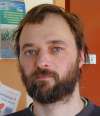Achim Grelle

Presentation
During my master studies of physics in Göttingen, Germany, I specialized on fluid dynamics and eventually on meteorology and micrometeorology as large-scale fluid dynamic applications. Realizing the vast importance of ecosystem fluxes for the climate system I devote my research to studies of processes that control ecosystem gas exchange from the microbial to the global scale, to quantification of greenhouse gas sources and sinks, and to impact studies that enlighten the effect of ecosystem management and disturbance on greenhouse gas fluxes.
The aim of my research is to provide a base for improved climate modelling, for more accurate greenhouse gas reporting, and for management recommendations to reinforce sinks and avert sources of greenhouse gases. Furthermore, studying gas- and energy fluxes at the ecosystem scale reveals exciting processes from the microbial to the regional level, bridging the gap between scales in space and time.
Development of innovative measurement technique and analytical improvement of available technology has always comprised a mayor part of my research. We have developed state-of-the-art systems for measuring turbulent fluxes of gases and energy under harsh high-latitude conditions, using the Eddy-Covariance (EC) and the Relaxed Eddy Accumulation (REA) technique.
Within the framework of my employment as project leader and scientific advisor at In Situ Instrument AB in Ockelbo I seek reliable, often novel solutions for individual research questions that require environmental measurements.
Teaching
The main subjects for undergraduate and graduate teaching are meteorology, micrometeorology, climatology and environmental measurement technique. Special focus is on climate change within the context of the IPCC.
Environmental analysis
MADNESS – impact of Management And Disturbance on Net Ecosystem Sources and Sinks of greenhouse gases
During past years, I have developed a network of 15 ecosystem flux stations that extends from Småland to Västerbotten and measures continuous fluxes of greenhouse gases and energy between terrestrial ecosystems and the atmosphere. Unlike other research infrastructures we focus on impacts of management and disturbances, using pairwise studies at forested and agricultural sites. Over 150 site-years of data have been collected so far, revealing exciting trends and extremes. For instance, recent findings indicate that changes in soil fungal communities may imperil the boreal forest C sink, which highlights the immense importance of multiannual time series. No funding is currently available for maintenance and upgrade of the network; grant applications are pending. Further on, the infrastructure shall be coordinated by SLU and LNU, and shall be open for researchers and user groups. The European infrastructure ICOS may benefit from our management perspective by association of certain sites, which in turn will increase our networking, visibility, and data availability. SLU and LNU represent the unique composition of outstanding expertise that is required for successful operation of such an infrastructure, including well-established cooperation with stakeholders and the agricultural and forestry sectors.
Selected publications
https://scholar.google.se/citations?hl=sv&user=13fTFcwAAAAJ&view_op=list_works&sortby=pubdate
Links
https://www.slu.se/vaxthusgasfloden
https://www.youtube.com/watch?v=1BSubtmclRQ